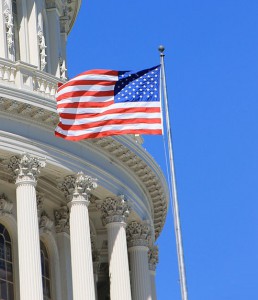For Which It Stands Secular patriots want to be honest when they recite the Pledge of Allegiance

When Congress inserted the words “under God” into the Pledge of Allegiance in 1954, its intent was clear: to strike “at the philosophical roots of communism, atheism, and materialism.” So declared the sponsor of the House bill, Rep. Louis C. Rabaut (D-MI), who further remarked that an atheist American “is a contradiction in terms.” What’s more troubling than Rabaut’s prejudice is that these words were added to indoctrinate children attending public schools. Giving the legislation his imprimatur, President Dwight D. Eisenhower envisioned that “the millions of our schoolchildren will daily proclaim… the dedication of our Nation and our people to the Almighty.”
Unsurprisingly, the unjustified stereotype that atheists are unpatriotic, disloyal, and un-American has continued to this day in large part because public schools across the country require the daily recitation of “under God.” Used in the context of an exercise designed to instill patriotism and loyalty in schoolchildren, the “under God” language sends a strong message that true patriots believe in God and that nonbelievers are unpatriotic. Furthermore, this practice places nonbelievers in the dilemma of having to choose to say a pledge that denigrates their beliefs or absent themselves from the exercise altogether, thus giving the appearance that they are unpatriotic. While it’s true that some students may choose to participate and omit “under God,” those children risk “outing” themselves to a classroom full of God-believers who associate the words with loyalty to their country.
As a result of this discrimination, the Appignani Humanist Legal Center of the American Humanist Association (AHA) filed a lawsuit, Doe v. Acton-Boxborough Regional School District, challenging Massachusetts’s pledge practice under the state’s Equal Rights Amendment, which specifically prohibits discrimination on the basis of “creed.” The case was argued in September before the Massachusetts Supreme Judicial Court by former AHA President David Niose. In national news coverage reporting on the case, FOX News anchor Dana Perino echoed the sentiment of Congress in the 1950s by declaring that if atheists “really don’t like it, they don’t have to live here.” Perino’s inflammatory remarks highlighted the importance of the AHA’s case.
Unlike other Pledge of Allegiance lawsuits, the AHA’s case involves purely state issues and is the first case to challenge the pledge on the basis of equal protection alone. Every other case has challenged it under the Federal Establishment Clause, except for one, brought by the Freedom From Religion Foundation in 2010 under both the Establishment Clause and the federal Equal Protection Clause. Significantly, the Massachusetts ERA is more demanding than the federal Equal Protection Clause, at least with respect to religious discrimination. By uniquely prohibiting discrimination on the basis of creed, the ERA requires the government to prove that a law is “narrowly tailored” to further a “compelling governmental interest” whenever a law has the effect of discriminating against a group because of their religious beliefs. Thus, the AHA’s lawsuit, unlike the others, directly and strategically seeks to halt the unequal treatment and prejudice towards atheists inherent in the pledge practice.
Despite such obvious discrimination, the defendants argued that the practice is non-discriminatory because participation is voluntary. However, making the pledge optional doesn’t eliminate the message that the government is sending to schoolchildren on a daily basis: that true patriots are God-believers and if you’re a nonbeliever you simply don’t love and support your country to the same degree. While a God-believer can proudly say the Pledge of Allegiance, an atheist must choose to: (1) absent herself from the practice, thus alienating herself from her peers; (2) participate in the exercise that denigrates her beliefs; or (3) say a different pledge by omitting “under God,” which exposes that student and invariably makes her appear unpatriotic. No one would seriously contend that the daily recitation of “one nation against Christians,” “one nation under white superiority,” or “one nation in favor of atheists” is non-discriminatory merely because it’s optional.
Having to leave the classroom to avoid hearing the discriminatory language merely makes the practice more egregious, as it divides students into two classes: those who participate and those who don’t. This in turn, belies the notion that our nation is “indivisible.”
All students, regardless of their creed, should be able to meaningfully participate in a state-directed patriotic exercise. By using divisive language that stigmatizes nonbelievers, Massachusetts is denying atheists this opportunity and is perpetuating the stereotype that atheists are unpatriotic. The AHA’s lawsuit therefore has great potential to end such discrimination, at least in that commonwealth’s public schools, and hopefully beyond.![]()
